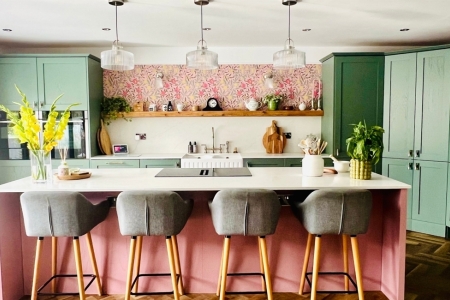By working with a plethora of British furniture businesses, the team at industry search and comparison website ufurnish.com has come to truly appreciate the qualities of products designed and made in the UK, writes founder and CEO, Deirdre Mc Gettrick …
As the founder and CEO of ufurnish.com, I get the great pleasure of working with so many amazing British furniture designers, manufacturers and retailers. It’s the part of my job I love the most!
In an age where mass production and global supply chains dominate much of the consumer goods industry, British-made furniture stands out as a beacon of authenticity, quality and sustainable design. Rooted in centuries-old traditions while embracing innovation and contemporary aesthetics, the UK's furnituremakers continue to shape the interiors of homes with a unique blend of craftsmanship and character.
But celebrating British-made furniture is more than championing locality – it’s about recognising the people, processes and principles that set the industry apart and create a platform for its furniture success.
Britain's legacy of furniture craftsmanship
The British Isles have long been known for their skilled artisans and master furnituremakers. From the elegant Georgian designs of the 18th Century to the clean lines of mid-century modern, British furniture has often reflected broader cultural shifts while maintaining a distinctive national style.
This legacy persists in modern workshops across the country, from Yorkshire to Devon, and from the Cotswolds to the Scottish Highlands.
You can’t talk about British furniture without mentioning historic names like Chippendale, Hepplewhite, and Morris. These pioneers established a foundation of design excellence that today’s furniture brands still draw inspiration from.
Yet what distinguishes contemporary British furniture is its ability to evolve. Today's furnituremakers don’t merely reproduce the past – they reinterpret tradition for modern living, using eco-friendly materials, minimalist design, and even smart technology to meet today’s tastes and needs for the consumer market.
Local design – from concept to creation
At the heart of British-made furniture is a commitment to local design. Unlike imported pieces that are often standardised and impersonal, British-designed furniture reflects the sensibilities of its environment and the originality of its creators.
Design studios across the UK are known for blending form and function in elegant ways. Whether it’s a minimalist oak table inspired by the Yorkshire moors or an upholstered armchair echoing the charm of a Cornish cottage, British furniture design is deeply contextual. Local designers collaborate closely with artisans and material suppliers, ensuring that each piece is not only aesthetically pleasing but also practical and durable.
Design institutions such as the Royal College of Art and Central Saint Martins in London continue to produce world-class talent who push the boundaries of what furniture can be. At the same time, smaller studios in places like Bristol, Brighton and Edinburgh champion bespoke design and limited production, offering consumers furniture that is truly one of a kind.
One initiative very close to my heart and driven by the amazing Barbara Chandler is Green Grads, an organisation which aims to identify, promote and enable a new generation of UK graduate eco-activists, linking them with furniture manufacturers, design practices, shops, galleries, the media/internet and the public at large.
Manufacturing at home – supporting local economies
One of the key benefits of British-made furniture is that it supports local economies. Manufacturing furniture in the UK creates jobs not just in workshops but also in related industries like textiles, woodworking and metalworking. Many of these are SMEs that are integral to rural and regional communities.
The UK’s manufacturing ecosystem includes both heritage manufacturers and innovative newcomers. Ercol, based in Buckinghamshire, have been producing high-quality wood furniture since 1920, combining traditional woodworking with contemporary design. Meanwhile, Harrison Spinks proudly design and handmake world-leading beds and mattresses, all from their farm in Yorkshire and Innovation Centre of Excellence in Leeds.
Another benefit of domestic manufacturing is quality control. British manufacturers often prioritise precision, durability and finish, ensuring that the furniture not only looks good but stands the test of time. This attention to detail is particularly important in a world where fast furniture often ends up in landfill within a few years.
Sustainability and ethics
Sustainability is no longer a trend, it’s a necessity in today’s world, and consumers expect to see furniture manufacturers and retailers doing all they can in this area. British furnituremakers have been leading the way in ethical production, often exceeding the environmental and labour standards found in other countries.
Many UK brands source FSC-certified wood, use low-VOC finishes, and minimise waste through lean production methods. Some go further, offering repair services or take-back schemes to ensure their products remain out of landfill.
This commitment extends to social ethics as well. By keeping production local, British furnituremakers can ensure fair wages, safe working conditions, and opportunities for apprenticeships and training. It also means a lower carbon footprint, thanks to reduced transportation
Branding – British identity in the global market
Branding plays a crucial role in how British-made furniture is perceived, both domestically and internationally. The Made in Britain label carries with it a reputation for quality, integrity and style. This branding is not just about geography – it encapsulates a way of working that values authenticity over imitation, and craftsmanship over convenience.
Many British furniture brands capitalise on this reputation by emphasising their origins in marketing materials, product labelling, and even in the naming of furniture ranges. Local materials, regional dialects and British icons often inspire product names and descriptions, imbuing the furniture with a sense of place and narrative.
ufurnish.com has been particularly focused on supporting British furniture brands and emphasising the importance of buying British. In a recent campaign with Harrison Spinks, our content team worked hard to bring to life the unique history of the business and weave in their amazing design and manufacturing story, which exemplifies the success of their business over decades.
Contemporary trends and innovations
The British furniture industry is not only about tradition, it’s also about innovation. Technological advancements are playing a greater role in design and manufacturing. CNC machinery, laser cutting and digital modelling tools allow for greater precision and customisation than ever before.
There is also growing demand for modular and multifunctional furniture, catering to the needs of urban dwellers with limited space. British designers are responding with intelligent solutions such as foldaway desks, stackable stools and modular sofas that reflect the changing way people live and work.
Moreover, the fusion of materials – wood with metal, ceramic, glass and recycled plastics – creates opportunities for new textures and structural possibilities. Collaborations between furnituremakers and artists or engineers are becoming more common, further enriching the British furniture landscape.
The future of British-made furniture
As we move into a future defined by sustainability, digitalisation and localism, British-made furniture is uniquely positioned to thrive. It speaks to a growing consumer desire for products that are meaningful, responsibly made, and connected to place and people.
To fully capitalise on this potential, however, the industry must continue to invest in skills training, apprenticeships, and digital infrastructure such as AI.
Government support and public awareness campaigns can also play a role in encouraging consumers to choose British made over cheaper imports. Events like the London Design Festival, Clerkenwell Design Week and regional craft fairs provide important platforms to showcase the depth and diversity of British talent.
Ultimately, celebrating British-made furniture is about more than promoting products – it’s about honouring a tradition of creativity, skill and resilience. It’s about understanding the value of things made with care – not just for how they look, but for how they last and what they represent. In every dovetail joint, hand-stitched cushion or naturally oiled finish lies a story of local pride and global excellence.
This article introduced our Best of British feature in July's issue.











